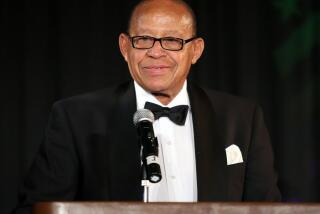BOOK REVIEW : Fame of a Forgotten War Correspondent : THE REPORTER WHO WOULD BE KING A Biography of Richard Harding Davis; <i> by Arthur Lubow</i> ; Scribner’s $30; 448 pages
- Share via
Richard Harding Davis was the kind of dashing and debonair war correspondent “who brings a folding bathtub and a dinner jacket to the front so that he can dress properly in the evening.” Davis traveled in equally high style during peacetime, earning a $500 fee from William Randolph Hearst to cover the Yale-Princeton football game on Thanksgiving Day, 1895.
“The figure was generally said to be the highest sum ever paid to a reporter for an account of a single event,” notes Arthur Lubow in his biography of Davis. “The edition sold out.”
The remarkable life and tumultuous times of Richard Harding Davis--from the Spanish-American War to the Great War--are evoked with style, authority and what can only be described as an attitude in “The Reporter Who Would Be King,” an ardent biography of a fin de siecle literary superstar.
According to Lubow, Davis--journalist, playwright, author--was a brilliant self-publicist, a sure-footed social climber who achieved the heights of the elite Four Hundred social set of late 19th-Century America and a highly successful seeker after fame and fortune. “The creation of his own personality was Davis’ greatest achievement,” Lubow observes.
For Lubow, a contributor to such journals as People and Vanity Fair, fame is the polestar by which a journalist navigates through the world, and he finds much irony in the fact that Davis was so thoroughly forgotten so soon after his death.
“To be famous virtually all one’s adult life and forgotten promptly at death: this is celebrity in its purest form,” writes Lubow. “Time, washing away the merely fashionable, has erased all impressions of Richard Harding Davis.”
Lubow, educated at Harvard and Cambridge, cannot be faulted for his scholarship--almost one-fourth of his book is devoted to end notes--but he also deserves to be praised for his high spirits, his discerning eye and his ability to make Davis into a mirror of his times.
“The Reporter Who Would Be King” is, among other things, a celebration of a generation of American journalists who prided themselves on their own imagined courage and chivalry. When Davis and Stephen Crane were covering the Rough Riders in Cuba during the Spanish-American War, for example, they came upon a fellow correspondent, gravely wounded and writhing in pain.
“What can I do for you?” asked Crane.
“Well, you might file my dispatches,” the wounded reporter said. “I don’t mean file ‘em ahead of your own, old man--but just file ‘em if you find it handy.”
Still, Lubow is mostly unsentimental about the fate that overtook the knight-errant of American journalism. Davis fled from a loveless (and probably sexless) marriage in middle age and took up with a showgirl: “His moral ballast,” Lubow observes, “insured that if he fell, he would fall hard.”
Social ambition, then as now, takes its toll, and Davis goaded himself into churning out copy in order to make money and keep up appearances. He logged each day’s output, and he fretted when a bout of illness slowed him down: “Each idle day,” he noted, “costs $150 at 12 pages a day.” His energy flagged, his health failed, the light of celebrity faded--and he was dead and forgotten at 51.
Lubow appears to be aghast at Davis’ abrupt descent from fame to obscurity. But the irony in Lubow’s book is slightly misplaced--why, after all, should we be surprised at the obscurity of a turn-of-the-century newspaperman when the “superstars” featured in last week’s issue of People are likely to be forgotten in a matter of days?
A more pointed irony, I think, is to be found in Lubow’s description of how early 20th-Century journalism hungered for style, personality and romance in the face of profound human horror. What Lubow allows us to understand is that not much has changed in the appetites of the mass media since Richard Harding Davis toted his bathtub to the trenches.
More to Read
Sign up for our Book Club newsletter
Get the latest news, events and more from the Los Angeles Times Book Club, and help us get L.A. reading and talking.
You may occasionally receive promotional content from the Los Angeles Times.







